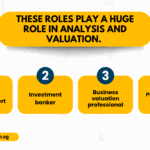Valuation Of Asset Management Company: Every business has unique characteristics that contribute significantly to the value. Some of the factors are personally related to those operating the business, while others are endemic. The asset management company has both characteristics.
There are many reasons why an asset management company owner decides to sell his company. Whatever the case is, an expert appraiser should be hired to help you determine your company’s fair value. The appraiser uses different approaches to getting the reasonable market price of your company that you built for years.
An asset management company is responsible for investment assets management with bonds, cash, stocks, and other marketable securities. An asset management company also manages commodities, private equity, real estate, venture capital, currencies, and private investment.
When you want to value an asset management business, consider the following factors:
1. Type of clients
The value of a company has a lot to do with the clients or customers. It is not just in the number of the customers but also the type of customers. You should find out the age bracket of the company’s customers and how loyal the customers are. The value will be significantly influenced when an asset management business has more old customers than young customers.
Check the growth-oriented young clients more than clients close to or already in retirement. For example, if the company has more customers over 50 years, the value should not be as an asset management company with customers below 50 years.
2. Loyalty of clients
Another factor to consider while determining the value of an asset management company you want to buy is the level of customer loyalty. Will the customers remain with the business after the transition is an essential factor to consider? If the number of loyal customers is small, you might reconsider your decision as a potential buyer or investor unless you use the business for a different service.
3. Compensation model
You should find out if the compensation model of the business is based on a fee or has referral fees or performance bonuses or commissions included.
The main thing to look out for in the business valuation is if the business is predictable, profitable, and sustainable. The value of the asset management company will increase when it has steady and recurring revenues.
The other factors to consider when determining the value of an asset management company is in size) scalability) of the business, revenue source and growth, employee demographics (relationship with customers, number of employees and their tenure, and revenue relationship to the business owner. Some of the important valuations used for the valuation are
A competent business valuation service examines more than just the above industry factors when valuing the business. Many business owners are taken aback when they discover that their company, or even a piece, has no monetary worth. According to the conditions surrounding the transfer of equity ownership, several legal considerations play a significant role in determining the company’s value.
While each of the following subjects has the necessary complexities, our primary objective is to assist you in combining the economics of value with the legal framework.
The appraisal date is the date on which the analysis is centered. For example, the date of opening or the closing date of a transaction may be defined by legal regulations relating to that occurrence.
For a value to be accurate, it must be clear what it is for. A value calculated for one reason may or may not apply to a different one. The “standard of value” is determined by the valuation.
As a legal notion, the business valuation factors have an impact on the standard of value as well as overall worth. One of the most widely accepted criteria of worth is fair market value, which is often used in tax law. As well as investment value (in the context of buy-and-sell transactions), statutory fair value (in the context of corporate reorganizations), and intrinsic worth (public securities analysis). You need to know how to calculate a business valuation to get an accurate valuation of the standard of value of your business.
When business owners analyze the worth of their company, they often examine the whole company. The value of a single share is equal to the total value divided by the number of shares in circulation. Although this technique may be suitable in valuation, it may not be appropriate if the whole block of stock does not have control over the company; in such situations, the value of a single share will be less than the entire divided by the number of shares.
Although it might be difficult, it is crucial to determine if the company should be valued based on its majority or minority ownership. As a result, a minority interest may be valued at a lower price than a share of stock regarded as a control block because of the lack of control and marketability of the minority stakeholder. The value of a business interest might be better understood if you have a firm grasp of the fundamentals of these topics or get business valuation advisory services.
Without testing business valuation techniques, valuation analysis is incomplete. Whatever methods are used to value asset management, the result should be a value that is consistent with expectations for the organization concerning industry pricing. This could, in the end, fall within a general rule of thumb, but that is just by chance. With time and practice, we have learned that in asset management, like in many other industries, opportunities may be maximized while risks are minimized.
Always call on an appraiser to assist you in determining the value of your company to get the best price for it when you want to sell it or buy it out. Some factors to be considered have been mentioned above, but many other parameters and adjustments can get you a reasonable price for your company.





